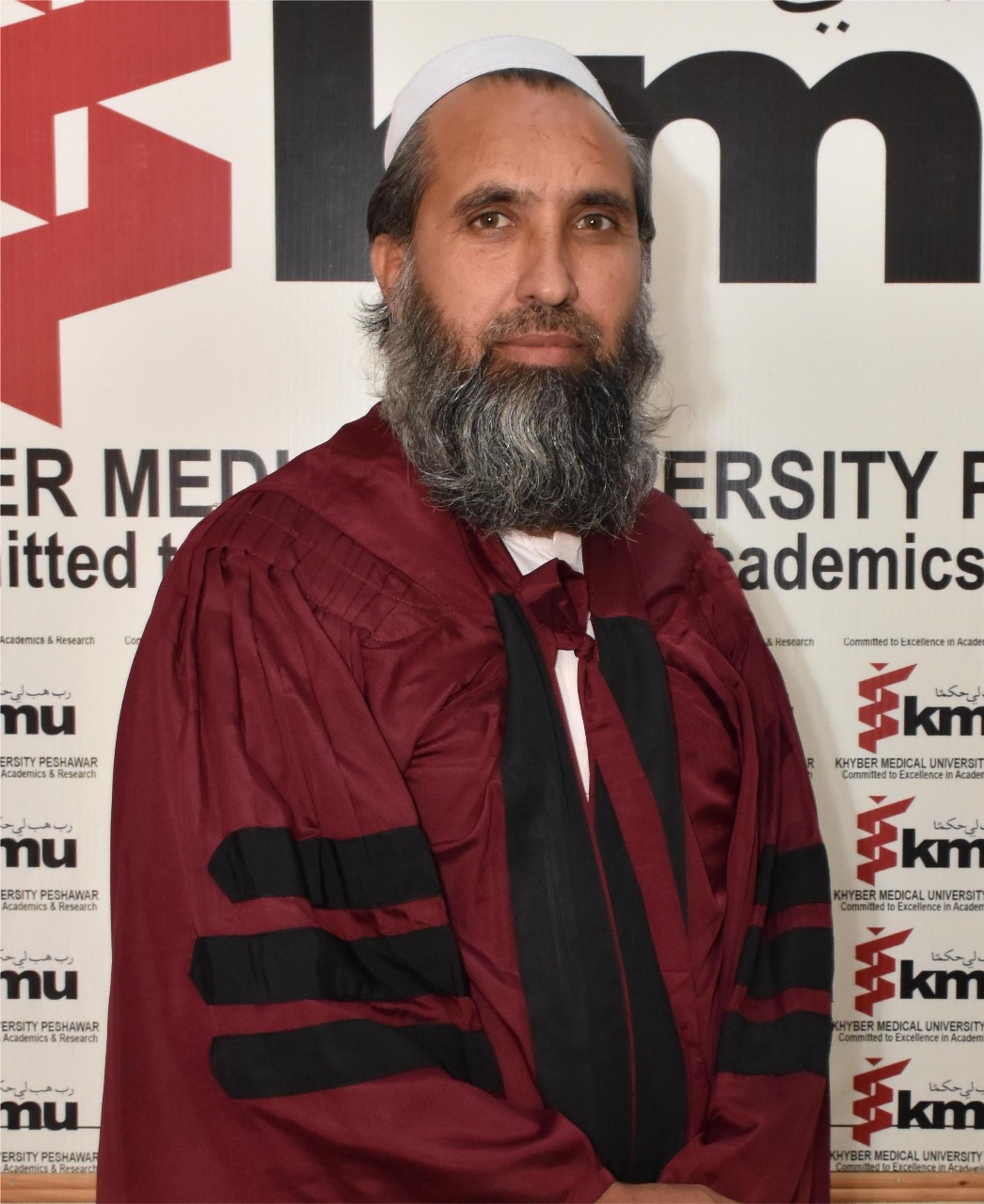
Designation: Associate Professor Histopathology
Qualification: PhD Histopathology
Email: walayats.ibms@kmu.edu.pk
Research interests, additional qualifications and experiences:
Dr. Walayat Shah is currently serving as Associate Professor in Histopathology at IPDM-KMU. He
joined KMU in 2010 as Assistant Professor under NRPU program of HEC and since Jan. 2011 he is
a regular employee. He is amongst the pioneer faculty members who started MPhil and PhD
program at IBMS KMU and has supervised more than 20 MPhil and PhD scholars in
histopathology. Dr. Shah has obtained his PhD Degree in Pathology and Pathophysiology in 2009
from Xian Jiatong University, Xian, People Republic of China, sponsored by overseas PhD
scholarship program of HEC of Pakistan. Earlier than that he did his MSc and MPhil in Biological
Sciences from Quaid-i-Azam University Islamabad. His area of interest is cancer research and
molecular pathology with special emphasis on HPV related cancers.
Since the inception of MPhil and PhD program in IBMS KMU he has been actively involved in
designing MPhil and PhD course documents and served as Course coordinator for the initial five
years of these programs. He has been teaching various courses including cell and molecular
biology, cancer genetics, nervous system, endocrine and mammary glands, histopathological
techniques, respiratory and cardiovascular pathology, urogenital & breast pathology and
cytology and head & neck pathology. He has expertise in routine histopathological techniques,
immunohistochemistry and molecular techniques.
Research Publications:
1. Shah W, Hongwei C, Jin Z, Lifang D, Jun Y, Yili W. The Prevalence of Human
Papillomavirus Type 58 in Chinese Patients with Cervical Carcinoma and its
Influence on Survival. Clinical Oncology. 2009; 21:768-74.
2. Yan X, Walayat S, Shi Q, Zheng J, Wang Y. Development of a soluble PTD-
HPV18E7fusion protein and its functional characterization in eukaryotic cells.
Acta Biochimica et Biophysica Sinica. 2009; 41:900-9.
3. Yan X, Shah W, Li X, Wang Y. Estrogen contributes to non-pRb targeted
HPV18E7-caused cell proliferation and transformation. Cancer Biology and
Therapy. 2010; 9:206-14.
4. Yan X, Shah W, Jing L, Chen H, Wang Y. High-risk Human Papillomavirus
type 18 E7 caused P27 elevation and cytoplasmic localization. Cancer Biology
and Therapy. 2010; 9:728-35.
5. Gao M, Long J, Li Y, Shah W, Fu L, Liu J, Wang Y. Mitochondrial decay is
involved in BaP-induced cervical damage. Free Radical Biology & Medicine.
2010; 49:1735-45.
6. Shah W, Yan X, Jing L, Zhou Y, Chen H, Wang Y. Reversed CD4/CD8 ratio of
tumor infiltrating lymphocytes and high percentage of CD4+FOXP3+
regulatory T cells are significantly related with the clinical outcome in
squamous cell carcinoma of cervix. Cellular & Molecular Immunology. 2011;
8:59-66.
7. Gao M, Li Y, Long J, Shah W, Fu L, Lai B, Wang Y. Induction of oxidative
stress and DNA damage in cervix in acute treatment with benzo[a]pyrene.
Mutation Research - Genetic Toxicology and Environmental Mutagenesis,
2011; 719:52-9.
8. Wang Q, Zhang C, Walayat S, Chen HW, Wang Y. Association between
cytokine gene polymorphisms and cervical cancer in a Chinese population.
European Journal of Obstetrics & Gynecology and Reproductive Biology,
2011; 158:330-3.
9. Gao M, Li Y, Sun Y, Shah W, Yang S, Wang Y, Long J. Benzo[a]pyrene
Exposure Increases Toxic Biomarkers and Morphological Disorders in Mouse
Cervix. Basic & Clinical Pharmacology & Toxicology. 2011; 109:398-406.
10. Sultana N, Hashim TK, Jan SY, khan Z, Malik T, Shah W. Primary cervical
hydatid cyst: a rare occurrence. Diagnostic Pathology. 2012; 7:157.
11. Qinfeng S, Depu W, Xiaofeng Y, Shah W, Hongwei C, Yili W. In Situ
Observation of the Effects of Local Irradiation on Cytotoxic and Regulatory T
Lymphocytes in Cervical Cancer Tissue. Radiat. Res. 2013; 179:584-9.
12. Moosa NY, Khattak N, Alam MI, Sher A, Shah W, Mobashar S, Alam MI, Javid
A. Comparison of cervical cell morphology using two different cytology
techniques for early detection of pre-cancerous lesions. Asian Pac J Cancer
Prev. 2014; 15(2):975-81.
13. Guo C, Liang F, Shah W, Yan X. Hydrogen sulfide protected gastric epithelial
cell from ischemia/reperfusion injury by Keap1 s-sulfhydration, MAPK
dependent anti-apoptosis and NF-κB dependent anti-inflammation pathway.
Eur J Pharmacol. 2014; 725:70-8.
14. Gao M, Li Y, Xue X, Long J, Chen L, Shah W, Kong Y. Impact of AhR, CYP1A1
and GSTM1 Genetic Polymorphisms on TP53 R273G Mutations in Individuals
Exposed to Polycyclic Aromatic Hydrocarbons. Asian Pac J Cancer Prev. 2014;
15(6):2699-2705.
15. Gao ML, Chen L, Li YF, Xue XC, Chen L, Wang LN, Shah W, Kong Y.
Synergistic Increase of Oxidative Stress and Tumor Markers in PAH-Exposed
Workers. Asian Pac J Cancer Prev. 2014; 15(17):7105-12.
16. Khan A, Shah W, Khan MA, Khan MJ, Shah SAA. Significance of
endoscopy/colonoscopy versus microscopy in patients with chronic diarrhea. J
Med Sci. 2014; 22(3):132-6.
17. Javaeed A, Shah W, Akhtar R, Ghauri SK, Khan SH, Alvi AH. Diagnostic
accuracy of IgA anti-tissue transglutaminase antibodies in comparison with
histopathological findings in celiac disease in Pakistan. Med. Forum. 2014;
25(12):15-9.
18. Attaullah M, Shah W, Pervez SN, Khan S, Jehan S, Rahim S.
Cytomorphological pattern of superficial lymphadenopathy. Gomal J Med Sci.
2014; 12:197-200.
19. Akbar S, Pervez SN, Shah W. Manual Liquid Based Cytology for Pap smear
preparation and HPV detection by PCR. Asian Pac J Cancer Prev. 2015;
16(2):579-83.
20. Fu L, Wang D, Shah W, Wang Y, Zhang G, He J. Association of Human
Papillomavirus Type58 with Breast Cancer in Shaanxi Province of China. J Med
Virol. 2015; 87(6):1034-40.
21. Khan MA, Shah W, Jehan S. Cytomorphology Versus Conventional
Microbiological Tests in the Diagnosis of Tuberculous Lymphadenitis. J Coll
Physicians Surg Pak. 2015; 25(6):422-6.
22. Gao M, Li Y, Ji X, Xue X, Chen L, Feng G, Zhang H, Wang H, Shah W, Hou Z,
Kong Y. Disturbance of Bcl-2, Bax, Caspase-3, Ki-67 and C-myc expression in
acute and subchronic exposure to benzo(a)pyrene in cervix. Acta
Histochem. 2016; 118(2):63-73.
23. Ji X, Li Y, He J, Shah W, Xue X, Feng G, Zhang H, Gao M. Depletion of
mitochondrial enzyme system in liver, lung, brain, stomach and kidney
induced by benzo(a)pyrene. Environ Toxicol Pharmacol. 2016; 43:83-93.
24. Sultana N, Shah W, Ullah S, Ali M, Basharat S. Primary Hydatid Cyst of the
Thyroid Gland: A Case Report. Ann Clin Pathol 2016; 4(3): 1070.
25. Javaeed A, Shah W, Ghauri SK, Akhtar R. Diagnostic Accuracy of anti-
endomysial antibody in celiac disease. J Coll Physicians Surg Pak. 2016;
26(6):541-542.
26. Cao M, Shah W, Qi J, Zhou Y, Wang Y, Chen H. Prognostic significance of
human papillomavirus viral load in correlation with different therapeutic
modalities in cervical cancer patients. Pathol Res Pract. 2016; 212(9):804-10.
27. Wang D, Fu L, Shah W, Zhang J, Yan Y, Ge X, He J, Wang Y, Li X. Presence of
high risk HPV DNA but indolent transcription of E6/E7 oncogenes in invasive
ductal carcinoma of breast. Pathol Res Pract. 2016; 212(12):1151-1156.
28. Shah H, Khan MA, Shah W. Histopathological pattern of 400 cholecystectomy
specimens. J Postgrad Med Inst 2016; 30(3): 250-3.
29. Naz S, Javaid A, Shah W. Frequency of malignant cells in sputum cytology of
tuberculosis suspected patients. Adv Basic Med Sci. 2017; 1(1): 16-20.
30. Javaed A, Shah W, Ghauri SK. Gender prevalence in Celiac Disease. Adv
Basic Med Sci. 2017;1(2):48-50.
31. Khan MA, Shah W, Javed K. Seroprevalence of hepatitis B and C virus in
voluntary blood donors at tertiary hospital of Bannu, Pakistan. Adv Basic Med
Sci. 2017;1(2):51-54.
32. Sultana N, Basharat S, Hanif M, Khan I, Ullah S, Shah W. Geodemographic-
Variations-in-Subtypes-of-Esophageal-Carcinoma-amongst-Afghanis-and-
Pakistanis-Patients-in-Northwest-Pakistan. Int j pathol 2018;16(4): 90-95.
33. Khan M, Nadhman A, Shah W, Khan I, Yasinzai M. Formulation and
Characterization of a Self-nanoemulsifying Drug Delivery System of
Amphotericin B for the Treatment of Leishmaniasis. IET Nanobiotechnol.
2019; 13(5): 477-483.
34. Khan M, Ali M, Shah W, Shah A, Yasinzai M. Curcumin loaded self-
emulsifying drug delivery system (cu-SEDDS): A promising approach for the
control of primary pathogen and secondary bacterial infections in cutaneous
leishmaniasis. Appl Microbiol Biot. 2019; 103(18):7481-7490.
35. Meng C, Ying W, Depu W, Yixin D, Wei H, Nana Z, Shah W, Yili W, Hongwei
C. Increased high-risk human papillomavirus viral load is associated with
immunosuppressed microenvironment and predicts a worse long-term
survival in cervical cancer patients. Am J Clin Pathol. 2020; 153 (4), 502-512.
36. Lei B, Qian L, Zhang Y, Chen Y, Gao M, Shah W, Cao X, Zhang P, Zhao W,
Liu J, Wang J, Ma X, Yang Y, Meng X, Cai F, Xu Y, Luo J, Wang B, Zhang Y, He
A, Zhang W. MLAA-34 knockdown shows enhanced antitumor activity via
JAK2/STAT3 signaling pathway in acute monocytic leukemia. J Cancer 2020;
11(23):6768-6781.
37. Sultana N, Shah W, Iqbal W, Pervez S, khan I, Hanif M, Khan I. Frequency
and genotype distribution of high risk human papillomavirus in esophageal
squamous cell carcinoma. J Infect Dev Ctries 2020;14(11):1320-1326.
38. Muhammad A, Shah W, Salam A, Sajjad M. The Relative Frequency of
Helicobacter Pylori Infection in Proximal and Distal Gastric Carcinomas.
Adv Basic Med Sci. 2020;4(1):18-23.
39. Bibi M, Shah W, Asif M, Khattak MT , Jamil A, Nasib B. Correlation
of Human Epidermal growth factor receptor (Her2-Neu) marker with the
Grades of Urothelial Carcinoma. J Saidu Med Coll Swat 2021;11(1):24-29.
40. Kamran M, Baloch FA, Shah W. Comparison of cell blocks and smear
examination with fine needle aspirates in the diagnosis of superficial
palpable head and neck lesions. Khyber Med Univ J 2021;13(4):244-250.
41. Khan M, Orakzai SA, Shah W, Ali A, Sarwar A, Husnain M, Dawood F, Shareef
N. Estimation of blood manganese (trace element) levels in patients of
hepatitis C, cirrhosis and hepatocellular carcinoma. Adv Basic Med Sci.
2022;6(1):03-07.
42. Daud F, Waheed N, Khan M, Deeba F, Shah W, Shaukat S. Morphological
Changes in the Trabecular Meshwork in Eyes with Primary Open Angle
Glaucoma. Int.j.pathol.2023;21(1):3-7.
43. Hakim S, Shah W, Khan J, Khattak JI, Khan MI, Sohail M. PCR Based
Detection of Cutaneous Leishmaniasis. PJMHS 2023;17(1):631-634.
